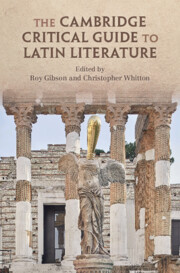Book contents
- The Cambridge Critical Guide to Latin Literature
- The Cambridge Critical Guide to Latin Literature
- Copyright page
- Dedication
- Contents
- Figures and Tables
- Contributors
- Preface
- Abbreviations
- Chapter 1 Introduction
- Chapter 2 Canons
- Chapter 3 Periodisations
- Chapter 4 Author and Identity
- Chapter 5 Intertextuality
- Chapter 6 Mediaeval Latin
- Chapter 7 Neo-Latin
- Chapter 8 Reception
- Chapter 9 National Traditions
- Chapter 10 Editing
- Chapter 11 Latin Literature and Linguistics
- Chapter 12 Latin Literature and Material Culture
- Chapter 13 Philosophy
- Chapter 14 Political Thought
- Chapter 15 Latin Literature and Roman History
- Chapter 16 Latin Literature and Greek
- Envoi
- Index Locorum
- General Index
- References
Chapter 16 - Latin Literature and Greek
Published online by Cambridge University Press: 04 January 2024
- The Cambridge Critical Guide to Latin Literature
- The Cambridge Critical Guide to Latin Literature
- Copyright page
- Dedication
- Contents
- Figures and Tables
- Contributors
- Preface
- Abbreviations
- Chapter 1 Introduction
- Chapter 2 Canons
- Chapter 3 Periodisations
- Chapter 4 Author and Identity
- Chapter 5 Intertextuality
- Chapter 6 Mediaeval Latin
- Chapter 7 Neo-Latin
- Chapter 8 Reception
- Chapter 9 National Traditions
- Chapter 10 Editing
- Chapter 11 Latin Literature and Linguistics
- Chapter 12 Latin Literature and Material Culture
- Chapter 13 Philosophy
- Chapter 14 Political Thought
- Chapter 15 Latin Literature and Roman History
- Chapter 16 Latin Literature and Greek
- Envoi
- Index Locorum
- General Index
- References
Summary
This chapter considers the impact of Greek on Latin Literature. Unlike the expectations of modern post-colonial theory, the imperial Romans were captured by Greek culture. Latin literature’s relation to Greek becomes a key moment in the cultural self-definition of Rome. This cultural history is explored first through Cato the Elder as a figure who publicly was scornful of the impact of Greek culture on Rome, and who became thus for later Romans an icon of conservative opposition to cultural change. The chapter then considers how much Latin Greek writers might be presumed to know and, conversely, how Romans explicitly paraded their adaption and adaption of Greek material and Greek language in their writings. Third, the chapter considers the politics of code-switching between Greek and Latin. Fourth, the chapter looks at how this cultural conflict becomes a matter of Christian ideology as part of a politics of translation between Hebrew, Greek and Latin: what changes when God’s word is transformed between languages? Finally, the chapter asks what is known by Latin literature that Greek does not know (and vice versa)? What boundaries should we place between Greek and Latin literature?
Keywords
- Type
- Chapter
- Information
- The Cambridge Critical Guide to Latin Literature , pp. 847 - 906Publisher: Cambridge University PressPrint publication year: 2024



